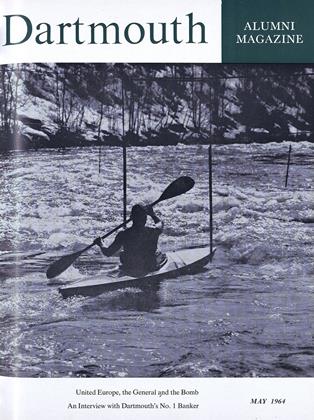By WyattBlassingame and Richard Glendinning'40. New York: Franklin Watts, Inc.,1963. 150 pp. $2.95.
By the authors of The Mountain Men (reviewed in our March issue), The FrontierDoctors presents a short, popular and lively account of another facet of the story when most of our country was young, when folk-medicine was still in vogue, and doctors were few and often very far between. It includes accounts of the rough but sometimes forward-looking medical practice of nine men and one woman.
Several of the figures described were not doctors at all but had studied with doctors to prepare themselves to take care of accident and disease in connection with their various assignments on the frontier. Most famous of such figures were Meriweather Lewis and William Clark who in their famous expedition to the Pacific Coast took care of all sorts of physical troubles. Others had attended one of the poor medical colleges of the day and at least three of those included in these pages were courageous and lucky enough, under very adverse conditions, to make substantial contributions to medical and surgical practice. One remembers Dr. Ephraim McDowell and the removal in 1809 of a twenty-pound ovarian tumor, without anesthesia; Dr. Crawford Long who was perhaps the first to experiment successfully with ether as an anesthetic; and William Beaumont who led to the first modern knowledge of the digestive processes with his gun-shot patient "with a window in his stomach."
Other chapters deal with medical characters equally courageous and interesting, though less famous, including the "Doctor of Dodge City" who became a leader in the important field of public health, and Dr. Bethenia Owens-Adair who in Washington and Oregon persisted in medicine when it still was not "nice" for a lady to be a doctor. The volume was written with teen-agers in
mind and makes no scholarly pretensions. It makes stimulating reading, however, for both young and old.
Professor of History
 View Full Issue
View Full Issue
More From This Issue
-
 Feature
FeatureUNITED EUROPE, THE GENERAL AND THE BOMB
May 1964 By HENRY W. EHRMANN, -
 Feature
FeatureDARTMOUTH'S NO. 1 BANKER
May 1964 By DERO A. SAUNDERS '35, -
 Feature
FeatureA New Strategy of Liberal Learning
May 1964 -
 Article
ArticleTHE UNDERGRADUATE CHAIR
May 1964 By DAVE BOLDT '63 -
 Class Notes
Class Notes1936
May 1964 By BARRY C. SULLIVAN, GILBERT BALKAM -
 Class Notes
Class Notes1922
May 1964 By LEONARD E. MORRISSEY, CARTER H. HOYT
ALLEN R. FOLEY '20
-
 Article
ArticleTHE RIVER
APRIL 1963 By ALLEN R. FOLEY '20 -
 Article
ArticleHANOVER DOGS 1963
MAY 1963 By ALLEN R. FOLEY '20 -
 Article
ArticleHANOVER CHARACTERS — 1963
NOVEMBER 1963 By ALLEN R. FOLEY '20 -
 Article
ArticleMORE ACROSS THE RIVER
DECEMBER 1963 By ALLEN R. FOLEY '20 -
 Article
ArticlePOPULATION AND POLITICS
MARCH 1964 By ALLEN R. FOLEY '20 -
 Article
ArticleTOWN AND GOWN
MARCH 1965 By ALLEN R. FOLEY '20
Books
-
 Books
BooksThe Real Turk
May 1915 By C. H. H. -
 Books
BooksADVENTURES IN BIOGRAPHY.
November 1956 By DONALD BARTLETT '24 -
 Books
BooksAIRPLANES AND HOW THEY FLY,
February 1944 By Herbert F. West '22. -
 Books
BooksThe Poet-Saints of Maharashtra
MARCH, 1927 By S. L. Joshi -
 Books
BooksTHE ROAD TO RENO.
June 1962 By W. R. WATERMAN -
 Books
BooksSOFT STATE: A NEWSPAPERMAN'S CHRONICLE OF INDIA.
JANUARY 1971 By WAYNE G. BROEHL JR

